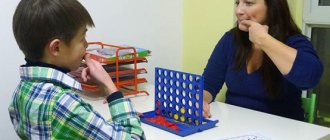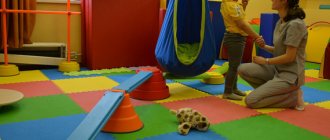- Who is a special education teacher?
- What is the job of a defectologist?
- Types of speech pathologists
- How do speech therapists differ from speech pathologists?
- What a defectologist should know and be able to do
- How to get an education as a defectologist
- How to remotely obtain qualifications as a teacher-defectologist at the Academy
Special pedagogy includes many interesting and in-demand professions. This includes a defectologist. There should be a special education teacher in every kindergarten where children with disabilities in physical and mental development are taught.
The concept of “speech pathologist-defectologist”: what is the peculiarity of the profession
A speech therapist at a correctional institution is a generalist. The staff of the correctional group includes a speech pathologist teacher, educators and an assistant educator. A speech pathologist-defectologist, in turn, like a doctor, can be assigned to a specific group of students, or can supervise children of the entire institution. Everything will depend on the size of the groups and the specific mental development of the children.
The teacher helps to compensate for the speech deficiencies of each of the children, and also conducts individual work, just like the group speech pathologist teacher (typhlo-, oligophrenic-, teacher of the deaf, etc.), according to the child’s development, age and mental characteristics. A speech therapist in a correctional kindergarten interacts with a psychologist, a speech pathologist, educators and a pediatrician working with these children. As a rule, speech disorders in such children are secondary, that is, they appear against the background of a primary (main) developmental problem. And depending on what acts as the root cause, the work of the speech therapist-defectologist will be structured. Therefore, this specialist has access to the medical records of each pupil: the opinions of a neuropsychologist, psychiatrist and other doctors.
Speech therapist: how and with whom he works
From the information presented above, it is clear that a speech therapist is the same defectologist, only highly specialized. However, speech therapists can also have different specializations.
Speech pathologist-defectologist
A speech therapist-defectologist is a professional with a pedagogical education who has undergone training in the field of defectology. His field of activity is speech disorders that develop in children with autism, mental retardation, cerebral palsy, neuroses, etc.
His training program includes areas of knowledge that make it possible to identify the root cause of speech defects and find an approach to the young student.
The following problems are under the supervision of a speech pathologist:
- Dysarthria (incorrect sound pronunciation due to limited mobility of the speech organs).
- Alalia – absence of speech with intact intelligence. May be partial or complete. Its common cause is brain damage.
- Rhinolalia (nasal syndrome). It is expressed in a change in voice timbre and distortion of sound pronunciation due to a violation of the resonator function of the nasal or nasopharyngeal region.
- Incorrect rate of speech: tachylalia (very fast pace), bradylalia (slow speech).
- Aphonia (dysphonia) – loss of sonority of the voice, the ability to speak only in a whisper.
- Stuttering is the forced repetition of sounds, syllables or words. May be manifested by frequent stops that disrupt the normal rhythm of speech.
- Speech defects arising from hearing problems.
- Consequences of operations on the hearing organs and speech apparatus.
- Problems that arise in the process of mastering reading and writing (dyslexia, dysgraphia, dysorthography).
The work of a speech pathologist-defectologist is aimed not only at teaching the correct pronunciation of sounds. He strives (as far as possible) to “pull up” the level of development of the ward, helping to adapt to the surrounding reality, improving his thinking, memory, and attention.
to contents ^
“Regular” speech therapist
Speech therapists work in kindergartens, schools, and various development centers. They are often called "regular speech therapists." Their task is to help healthy children without serious developmental disabilities. Usually these are graduates of the faculties of pedagogy or philological faculties.
The speech therapist not only “produces” sounds, but helps to enrich the vocabulary, works on intonation, teaches competent sentence construction, logical, coherent, beautiful speech. It is useful for schoolchildren in developing correct written speech.
About the profession of a speech therapist - in this video:
To summarize, we can say that a speech pathologist-defectologist is a specialist with a wider field of activity compared to an ordinary speech therapist. As a highly specialized defectologist, he is in charge of correcting speech disorders that arise against the background of developmental disorders. And “just a speech therapist” corrects speech deficiencies in healthy children.
to contents ^
History of the profession
Defectology began to actively develop from the middle of the 20th century. The profession itself appeared relatively recently in our country. At the beginning of the last century, doctors and teachers identified the need to work with special children comprehensively in every area, which meant expanding the staff in correctional kindergartens and schools, since educators or doctors alone are not able to pay due attention to all children at once.
And already in Soviet times, the first research center was opened in the capital - the Research Institute of Defectology. Speech therapy itself did not immediately join the ranks of pedagogical sciences; specialists in this profile initially worked in the field of medicine in speech therapy centers.
When is this or that specialist needed?
In recent years, more and more children are faced with developmental disorders, and more and more parents are looking for a competent and experienced specialist. Children who, for one reason or another, have problems with adaptation, speech development, communication and learning at school or kindergarten need the help of a highly specialized specialist. The root of the problem may be as follows:
- birth injuries;
- infections acquired during fetal development;
- diseases that arise at an early stage of development;
- disorders of neuralgic and psychological nature.
This is only a small part of the existing reasons. More specifically, parents whose children have been diagnosed with cerebral palsy, autism, echolalia, hearing or vision impairment often seek help.
Well-known teachers in the field of speech therapy and defectology
Speech therapy, as a branch of defectology, has been the subject of research by many scientists in the field of pedagogy and psychology. But the greatest contribution to the development of science and the development of programs to eliminate speech disorders was made by participants in the scientific school of L. S. Vygotsky.
Thanks to the work of such outstanding Soviet teachers as M. S. Pevzner, R. M. Boskis, R. E. Levina, A. R. Luria, this industry was formed.
But, if we talk about a narrower understanding of speech therapy work specifically within the framework of defectology, then it is necessary to note L. S. Volkova, who throughout her life was engaged in research in this area.
General tasks of speech pathologists
The main work of specialists is aimed at developing the child’s cognition, which is achieved through diverse programs and methods. This includes the development of memory, attention, and mental processes. Despite the narrow profile of special education teachers, they all solve similar problems:
- individual development of sensory skills;
- development of cultural and hygienic skills;
- the formation of correct speech, achieved by expanding one’s horizons (the teacher introduces the child to the world around him, thereby replenishing his vocabulary and forming coherent speech);
- demonstration of gaming techniques (if gaming skills do not correspond to the child’s age);
- acquisition of skills in written and oral speech by the method of auditory perception (the child finds sounds in spoken words);
- the formation of simple arithmetic skills (thanks to acquired knowledge about the quantitative and temporal features of objects);
- development of motor skills with the help of simple creative tasks.
Differences between a speech therapist and a speech pathologist
What is the difference between these two specialists, who perform essentially the same function? In both the first and second cases, the teacher is involved in the development of the child’s speech:
- formation of correct pronunciation: production, automation and differentiation of sounds;
- activation and expansion of vocabulary;
- development of the prosodic side of speech;
- compensation for speech disorders in GSD (general speech underdevelopment).
The most important difference is that, unlike a speech pathologist, a regular speech therapist works with children only with intact intelligence.
But the second specialist most often deals with children with disabilities in intellectual development. He works closely with a teacher-defectologist, with doctors (pediatrician, psychoneurologist), psychologist, educators and other specialists.
Defectologist and speech therapist for adults: are they needed and when to contact whom?
Not only a child, but also an adult may need the help of these specialists.
- It happens that it is necessary to correct speech defects that have been established since childhood (difficulties in pronouncing certain sounds, a lisp, problems with diction, rate of speech, etc.). This is especially important for people working in areas where there is constant communication and beautiful, intelligible speech is required. In these cases, you should contact a speech therapist - with the help of modern techniques, an experienced specialist will correct such deficiencies in a short time.
- A speech therapist will help if speech has lost clarity after dentures, as well as in getting rid of the accent in speech.
- If speech defects appear in an adult after a stroke or traumatic brain injury, the help of a speech pathologist is necessary.
There is a specialty of speech therapist-aphasiologist. He is engaged in the rehabilitation of people whose speech has completely disappeared due to a stroke or brain pathologies of various natures. This condition is called aphasia.
The sooner you start correcting speech disorders, the more confidently you can get a positive result. It is important to understand the difference between a speech therapist and a speech pathologist - this will allow you to go straight to the address without wasting precious time.
Indications for seeking help from a specialist
You should seek help from a speech therapist-defectologist if your baby has deviations from the norm in physical or mental development, namely:
- Vision problems (visually impaired and blind children).
- Hearing impairment (deaf and hard of hearing).
- Developmental delay (impaired attention, memory, thinking, perception and other cognitive mental functions), MMD (minimal cerebral dysfunction).
- Mental retardation or Down syndrome.
- Autism.
- Cerebral palsy (cerebral palsy), dysfunction of the motor system.
In some cases, with intact intelligence, but with instability of EMU (emotional-volitional sphere) and behavior, the child may also be recommended to work with special education teachers, including a speech pathologist-defectologist, if the child has speech problems.
Defectologist: who is he and what is the essence of the work
A defectologist interacts with children whose development deviates from the norm. Among his “wards” are adults. He works in educational institutions, medical and rehabilitation institutions.
There is an opinion that the name of the specialty “defectologist” is not entirely ethical, since it clearly indicates existing shortcomings. Therefore, he is also called a correctional or special teacher.
This is a specialist with higher pedagogical education received at defectology faculties. The defectologist training program, along with pedagogical disciplines, includes pathopsychology and a number of medical sections.
to contents ^
Help from a defectologist: when it is needed
First of all, the support of a defectologist is necessary for children who have been diagnosed with the following pathologies:
- Early childhood autism , expressed by impaired social interactions, stereotypical behavior, problems in contact with others.
- Cerebral palsy is a group of motor disorders that develop due to damage to brain structures in the perinatal period.
- Mental retardation , which occurs as a result of intrauterine infections, pathologies of pregnancy, prematurity, birth injuries, etc. Intellectual impairment here is mild, but simultaneously affects speech, memory, perception, attention, and thinking.
- Mental retardation is congenital or acquired characteristics, accompanied by impairments of intelligence, speech, motor skills, and the emotional-volitional sphere.
- Speech disorders caused by hearing and vision impairments.
- Any mental disorders , if they are accompanied by speech defects.
A defectologist does not treat the listed pathologies. It helps to compensate and correct developmental defects that arise against their background.
to contents ^
Specializations of a defectologist
In a broad sense, a defectologist is a specialist who is responsible for the problems of socialization, education, and upbringing of children with developmental disabilities. Based on the nature of such disorders, the specialization of defectologists may be different.
- Defectologist – teacher of the deaf . The population with which he works is hearing-impaired, late-deafened, deaf, and deaf-mute children. A defectologist studies the patterns of their development and develops special training and adaptation programs. He uses specific techniques (development of residual hearing), helps to master sign and dactyl languages, and gives recommendations on the use of modern technical devices to correct and compensate for hearing problems.
- A defectologist is a typhlopedagogue who works with those who have serious vision problems. We are talking about blind and visually impaired people. He studies the possibilities and conditions for compensation and correction of such violations, develops special programs, methods, and techniques. The typhlopedagogue has information about working with vision correction devices.
- A defectologist is a speech therapist who deals with severe speech disorders that arise against the background of mental and neurological pathologies that accompany auditory and visual problems, traumatic brain injuries, etc. He helps to identify the primary causes of speech defects and, in accordance with this, selects correction methods.
- Defectologist – oligophrenopedagogue . He is in charge of teaching and raising children (and sometimes adults) with intellectual disabilities. An oligophrenopedagogue helps develop intelligence and creates conditions for successful completion of a school course. He also works with children who have intelligence within the normal range, but suffer from inattention, restlessness, etc., and can carry out diagnostic tests regarding readiness for school. “People” often call such a specialist simply a defectologist, since parents are frightened by the word “oligophrenopedagogist.”
In practice, such a division among defectologists often turns out to be arbitrary, since complex, combined developmental defects are very common. And the general theoretical basis for the listed specializations is the same: all specialists know how developmental disorders are classified, they know the methods of diagnosing them, and methods of working with “special” children.
to contents ^
What does a speech pathologist do?
For your first visit to a speech pathologist, you need to take with you a medical record and the results of all examinations performed (if any).
The work of this specialist begins with a detailed collection of information, including the characteristics of the mother’s pregnancy and childbirth, the child’s behavior, and habits. To identify the severity of the defect, a comprehensive diagnosis of the patient’s development is carried out to determine how well it corresponds to age standards. Attention is focused on basic mental functions, emotional-volitional and intellectual spheres.
Having carried out the diagnosis, the defectologist selects the optimal methods and techniques and develops a corrective action plan. If necessary, he recommends consultations with highly specialized doctors (neurologist, orthodontist, psychiatrist, otolaryngologist, psychotherapist).
The duration of the defectologist’s work in each specific case depends on the severity of the defect and the dynamics during the correction.
How a defectologist conducts a lesson - in this video:
to contents ^
Problems that a specialist in this profile works with
A speech therapist with a correctional profile solves the problems of secondary speech disorders in children who need specialized help. Children with disabilities, profound mental retardation, autism and cerebral palsy also have delays in speech development. Complications may include:
- The reluctance on the part of the child to make contact with an adult (this is especially noticeable in autistic people).
- In limiting the physical capabilities of children (if the motor system is impaired, complications in coordinating the muscles of the speech apparatus are observed).
- In misunderstanding or complete refusal of help on the part of the parents of a special child (protest against comprehensive medical and pedagogical care). Often correctional specialists are faced with the fact that adults cannot accept the fact that the child is “not like everyone else.” In this case, it is important to be able to reassure parents, explain and prove to them the need to work in a specialized institution or group. The sooner help is provided, the greater the chance of compensating for developmental deficiencies and socializing the child.
The most difficult thing for a teacher to do is work with children who have severe forms of disabilities.
Problems of defectology
In modern conditions, not all persons with disabilities receive assistance. There are children with a complex structure of the defect, for example, deaf-blind. Until the last century, they were all considered unteachable, until the famous American teacher Anne Sullivan showed an example of teaching such a child. It is her photograph that is the title of this article.
Her student, Helen Keller, lost the ability to hear and see after a serious illness. The girl's fate was unenviable - an orphanage. But Sullivan has proven that it can be adapted to society. Keller became an activist, writer, and lecturer. Her activities were widely publicized in society. However, in the modern world, teaching such children is associated with a number of difficulties.
The increased number of children with autism spectrum disorder (ASD) requires speech pathologists to develop new training programs. In the last century they were considered mentally retarded, but modern research has refuted this. Work with such children should be aimed at developing communication skills.
To summarize, we can say that a defectologist carries out extremely complex, but very important work. Important for both the baby and his parents. This allows children to be socialized as much as possible in society.
What are the responsibilities of a speech pathologist?
A specialist in this profile works with special children as part of the educational program of a correctional institution. A speech pathologist-defectologist conducts:
- diagnostics of speech development of children with developmental problems;
- prevention and correction of sound pronunciation, general speech deficit;
- work with impaired writing and reading;
- work on developing the correct speed and rhythm of speech;
- correction to eliminate voice disorders.
His responsibilities include:
- Diagnose children according to their age, mental characteristics, maintain individual speech therapy examination cards for each child.
- Work closely with the parents of each student or pupil, providing the necessary information about the dynamics of academic performance and speech development, and provide advice on various issues within his competence.
- Conduct systematic individual and subgroup classes to eliminate speech problems.
What kind of work does he do with children?
Teaches, educates, introduces them to the world around them, and more - this is what a defectologist does with children. This is not the most complete list of activities. They depend on the type of violation. The overall goal is to develop motivation for learning.
At the first stage, the teacher-defectologist conducts an examination. It affects all aspects of development. It is checked how children make contact, how they react, and what their pace of work is. Thinking, understanding of instructions, visual and auditory perception are examined.
Based on the results obtained, the teacher divides the children into groups. Pupils in them have approximately the same level of development. It is not possible to conduct group lessons with some children: autistic people fall into this category; these children are more often assigned to individual lessons due to the specific nature of this developmental disorder.
Classes are conducted in several directions:
- At the first stage, familiarization with the surrounding world is carried out. Ideas about it and its laws are formed. They develop attentiveness and responsibility for their actions.
- The second stage is the development of elementary mathematical concepts. During classes, the defectologist talks about the size, shape of objects and other characteristics.
Much attention is paid to sensorimotor development. Separate work is being carried out on the development of sensations. For this purpose, finger pools are made with various cereals and small toys. It is useful to prepare aromatic food, study vegetables, fruits, berries, touch them, examine them with your fingers. All this helps children develop different sensations.
Children with mental retardation have problems with games. It is difficult for them to contact someone and follow the rules. Therefore, they need the help of a speech pathologist. He competently guides the actions of his students and helps them find a common language with each other.
Consultations for parents are also indispensable. A defectologist can answer all their questions, give advice and help cope with the child’s problems.
How to become a speech pathologist, what is necessary for this?
What do you need to do to become a correctional speech therapist? To become a teacher in this field, it is not enough to take regular courses; it is a document of higher education that will be needed to work in this field of activity.
Specialists of this profile receive education at the Faculty of Psychology and Education.
Studying at the department of special (correctional) pedagogy and psychology in the relevant field allows students to receive a bachelor's or master's degree upon completion (subject to passing the second stage of higher education) and subsequently work as a speech therapist in correctional schools or preschool educational institutions.
In addition, it is necessary to have both certain professional and personal qualities.
The first include:
- Teacher's competence.
- Ability to apply knowledge acquired at university in practice when working with special needs children.
- The desire to improve your skills, implement a correction program and engage in self-education in order to improve your qualifications, and constantly learn something new.
- Responsibly treat your activities, carry out high-quality work to eliminate speech problems.
The second ones include:
- Love for children (showing empathy).
- Patience, stress resistance.
- Resourcefulness and ability to think creatively.
How to remotely obtain qualifications as a teacher-defectologist at the Academy
If you have a university diploma, you can undergo a professional retraining program at the Academy. You can choose one of the areas of special pedagogy: Defectology, Speech Therapy, Typhlopedagogy, Oligophrenopedagogy. After completing it, you will receive a diploma with a qualification and learn how to effectively manage the development process of a child with disabilities.
Training takes place in a distance format. You sign up for the program and complete it in a convenient schedule, at any time convenient for you in the LMS system on the Academy website.
There is no need to install any additional software. The program meets the requirements of the Federal State Educational Standard and professional standards, and the Academy has a state educational license, so having this diploma and knowledge from the course will give you the opportunity to work in various institutions as a special education teacher.
The program developers are highly qualified specialists with extensive experience. Each student receives individual support; all questions during the training process are answered by an assigned methodologist.
Upon completion of training, a diploma of professional retraining of the established form is issued with the assignment of qualifications. The education document must be entered into the state database of the FIS FRDO and sent free of charge to any region and city of Russia.
Specialist salary
On average, a teacher’s salary is slightly higher than that of a special education teacher, but their work schedule is different. The difference in financial terms depends on several factors, due to which the following can be noted:
- In government institutions, workers' wages are somewhat lower, since they belong to budgetary organizations. Private preschool educational institutions and accredited schools pay employees a larger monthly salary, however, requirements and conditions may differ (work on weekends, in a room with cameras installed, etc.).
- The salary depends on the teacher’s salary and the number of groups of children with whom he conducts classes.
Most speech pathologists-speech pathologists have an additional workload of lessons with students with whom they study privately at home. This practice is widespread in the country; it is due to the need for systematic correctional classes with special children. The hourly wage for a teacher is significantly higher than in an educational institution.
Who is a special education teacher?
The term “defectologist” combines two words. "Defectus" in Latin means "lack" or "absence." "Logos" is translated from Greek as "teaching". A special education teacher is a specialist who trains, educates and analyzes the development of children with mental and physical disabilities.
Speech pathologists can be both theoreticians, engaged in research work, and practitioners, interacting directly with children in kindergarten. The first ones work in the scientific field - they develop technologies for teaching children with disabilities and mental retardation. And practitioners conduct correctional classes with children. The main task of the practitioner is to create conditions for the maximum possible development of children and their adaptation to normal life. He does not treat illnesses, but makes corrections and helps students in accordance with his competence.
What diseases does a speech therapist treat?
The following types of diseases that can be eliminated by a speech therapist include:
- aphonia, dysphonia (impaired speech sonority);
- dyslalia (impaired pronunciation of separately considered sounds: lisp, burr);
- logoneurosis (speech disorder in the form of stuttering);
- tachylalia, bradyllalia (impairments manifested in the speed of pronunciation);
- dyslexia (speech impairment manifested in reading skills);
- rhinolalia (that is, nasal sound);
- various speech disorders that occurred in patients due to deafness;
- disorders associated with hearing or pronunciation that arose as a result of the patient undergoing surgery or any injury.
How to become a speech pathologist
In order to start working in this specialty, you need to obtain a specialized higher or secondary education. Pedagogical universities and colleges have a defectology department where you can study to become a special education teacher.
The program must include the following disciplines:
- anatomical, physiological and clinical foundations of defectology;
- general, developmental, special pedagogy and psychology;
- speech practices;
- regulatory and legal framework of professional activity;
- genetics;
- psychological and pedagogical diagnostics of persons with disabilities.
In addition to the above, future defectologists receive detailed skills in raising and teaching children with various special needs, and many other subjects are also present. The exact list of disciplines studied depends on the chosen institution.
People who have specialized psychological or pedagogical education can retrain as a defectologist. In this case, training will take only a few months instead of 4-5 years.
Necessary qualities of a specialist
To successfully perform his work, a defectologist must be able to easily establish contact with children and maintain a comfortable atmosphere for them during classes, and have the skills to teach writing and reading using non-standard methods.
In addition to professional knowledge, the personal qualities of a specialist are important. This job is suitable for people who:
- have organizational skills;
- are able to make decisions quickly;
- attentive and patient;
- psychologically stable;
- love both preschool children and teenagers;
- can be strict when necessary;
- sociable;
- are not indifferent to other people's problems.
In addition, the teacher must have competent speech, clear diction and a good memory. Intuitive abilities are also important. They will be useful for selecting the appropriate technique.
Who is the specialty contraindicated for?
This specialty has some medical restrictions. It will not be possible to become a defectologist for people suffering from:
- visual, hearing or speech impairments;
- mental disorders;
- diseases of the central nervous system;
- convulsions or loss of consciousness;
- problems with the vestibular system or cardiovascular system.
In addition, in accordance with the labor code, persons who have a criminal record or have been subject to criminal prosecution are not allowed to work with children.
Working conditions
The work is quite difficult; a defectologist spends his entire day under conditions of high neuropsychic, emotional, intellectual and communicative stress. In addition, the correctional teacher is on his feet almost all the time.
The salary of a defectologist is small. In Moscow, a specialist’s work is paid in the amount of 22-100 thousand rubles; for the regions the amount is more modest, almost 2 times less.
However, talented specialists have career prospects. The most experienced and successful teachers can receive an academic degree and the position of director.
Workplace
Defectologists are employed in both public and private institutions. This can be almost any establishment where there are children, for example:
- schools;
- orphanages, kindergartens and boarding schools;
- medical and rehabilitation centers;
- sanatoriums.
Often speech pathologists with extensive experience give private lessons. Classes in this format can be held with one or several children at once.
When should you take your child to a speech therapist?
Due to the fact that in children the process of development of speech centers is not yet complete, and reading, diction, and pronunciation skills are actively developing, working on speech problems with a child will have more significant results than in the case of adults.
Parents should not place excessive demands on their child. This is especially true when the baby begins to speak. For example, by the age of one to one and a half years, the baby should pronounce at least a few words, and, starting from the moment of birth, make single sounds. As for clear and coherent speech with absolutely correct pronunciation, it is difficult to say exactly when it should appear in a child.
Among the objective reasons for a child under one year old to visit a speech therapist is the baby’s lack of pronunciation of sounds. Usually the baby reacts to words, touches, and toys with basic humming, babbling, and a smile. If this does not happen, you should not postpone your visit to the doctor.
In the period from one to three years, parents need to bring their child to a speech therapist if he is diagnosed with cerebral palsy, if there is a hereditary factor (late speech development in one of the parents), also if the child is diagnosed with problems with hearing and vision , or shortened frenulum of the tongue.
From three to five years of age, parents monitor the appearance of the following signs of speech development disorders:
- incorrect pronunciation of words or individual sounds;
- impaired pronunciation speed and swallowing sounds;
- the child confuses prepositions, conjunctions, cases, and does not respond to corrections;
- inability to clearly and consistently describe a picture or make sentences.
Carrying out rehabilitation after operations affecting the speech apparatus also falls within the competence of a speech therapist, and can be relevant at any age.
Parents need to clearly understand all the consequences of a situation when a child’s speech problems are allowed to take their course:
- Children with speech impairments usually master educational material worse, which is why school performance fluctuates between low and average;
- speech hearing impairment interferes with the study of foreign languages;
- impaired speech coherence makes it difficult to study oral subjects: biology, literature, history, and others;
- Speech defects cause problems with communication, the appearance of an inferiority complex, and psychological discomfort.
Features, pros and cons of the profession of speech therapist
“In their work, a specialist needs to show great patience and restraint,” notes teacher-speech therapist Vita Bilukha. — It is important to have goodwill, communication skills, and intuition. Observation and perseverance, flexibility of mind are required. After all, often the presentation of material has to be rearranged on the fly: you expect one thing, but have to work with another.”
One of the main difficulties of the profession is the need to work with “difficult” children. Without a sincere desire to help, to go through a long path of correction step by step, patience - it is very difficult to cope with the psychological load. Another significant disadvantage is the huge number of documents that a specialist must maintain when working in a budget institution. They either get used to this or go into private practice, where the specialist determines the scope of reporting for himself.
How many hours does a speech therapist work?
The standard work rate in a budget institution is 20 hours a week, that is, a speech therapist works 4 hours a day. This is one of the advantages of the profession: such a schedule allows you not to get tired or overloaded. There is always time left for personal matters, and if you wish, you can engage in private practice in your free time.
How long is a speech therapist's vacation?
Long vacations are another plus of the profession. Its duration is 56 days. And since specialists work in schools or kindergartens, where the educational process lasts from September to May, vacations always fall only in the summer months, which is also convenient.
pixabay.com/
How much does a speech therapist earn?
The salary level does not differ from the usual in the public sector. Depending on the region and place of work, a specialist can count on 17–20 thousand rubles per month. The average salary of a speech therapist in a school is usually higher than in a kindergarten.
“A speech therapist has no career growth as such,” clarifies Vita Bilukha. “But now more and more specialists are going into private practice. Those who have self-discipline and organizational character can achieve good results. In this case, the specialist himself sets the hourly wage.”
According to the expert, only those who like to feel the usefulness of their work and who want to help people become healthier and happier can successfully realize themselves in the profession. And only in second place in importance should come short working hours and long vacations. In this case, the person will enjoy his work.
Where can I find an experienced speech therapist?
The key to a child’s rapid and effective development is a well-chosen speech therapist with years of experience and dozens of reviews behind him. The Center for Restorative Medicine employs a specialist with extensive experience and continuous development in his field. Our clients include not only children, but also people who have suffered from strokes and severe traumatic brain injuries.
Here you and your child will be helped to forget about any problem: developmental delay, violation of the sequence of sounds, stuttering. In addition to serious psychophysical disorders, speech therapists are ready to tackle your unaesthetic speech and incorrect diction.
You can find out about the cost of admission on the website or by calling +7 (8552) 78-09-35, +7 (953) 482-66-62.







